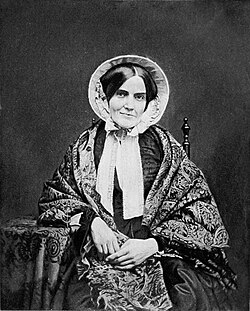Delia Bacon
Delia Salter Bacon (born February 2, 1811 in Tallmadge, Ohio , † September 2, 1859 in Hartford , Connecticut ) was an American teacher and author. She became known for her monograph on the question of the Shakespeare authorship debate (advocate of the Francis Bacon theory, without being related to him, an accidental identity).
She was a teacher in Connecticut , New Jersey , and New York until 1852 . During this time she wrote a book Tales of the Puritans ( 1831 ), a play The Bride of Fort Edward ( 1839 ), based on the story of Jane McCrea and partly written in blank verse , and The Philosophy of the Plays of Shakespeare Unfolded ( 1857 ).
She was one of the early doubts about the identity of William Shakespeare of Stratford as the author of the great canon of works. For this she spent several years studying in England , where she befriended Thomas Carlyle and Nathaniel Hawthorne . Within the authorship debate, she advocated the theory that works ascribed to Shakespeare should be written not by an individual but by a group including Francis Bacon, Sir Walter Raleigh and Edmund Spenser . She ended up morbidly obsessed with her idea and left England diagnosed with mental illness. She died in Hartford , Connecticut and is buried in the Grove Street Cemetery in New Haven , Connecticut.
Her nephew, Theodore Bacon, wrote a biography of her, Delia Bacon: A Sketch (Boston, 1888) and a chapter, Recollections of a Gifted Woman , in Nathaniel Hawthorne's Our Old Home (Boston, 1863).
Fonts (selection)
- The Bride of Fort Edward (Founded on an Incident of the Revolution) (1839)
- The Philosophy of the Plays of Shakspere Unfolded (1857), Project Gutenberg
Secondary literature
- Nina Baym : Delia Bacon, History's Odd Woman Out . In: The New England Quarterly 69, 1996, pp. 223-49.
- Nina Baym: Delia Bacon: Hawthorne's Last Heroine . In: Nathaniel Hawthorne Review 20: 2, 1994, pp. 1-10.
- Theodore Bacon: Delia Bacon, a biographical sketch , 1888, Archives
Web links
- Delia Bacon in the database of Find a Grave (English)
| personal data | |
|---|---|
| SURNAME | Bacon, Delia |
| ALTERNATIVE NAMES | Bacon, Delia Salter (full name) |
| BRIEF DESCRIPTION | American teacher and author |
| DATE OF BIRTH | February 2, 1811 |
| PLACE OF BIRTH | Tallmadge, Ohio |
| DATE OF DEATH | September 2, 1859 |
| Place of death | Hartford , Connecticut |
